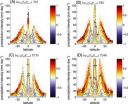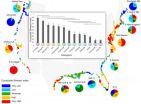(Press-News.org) In a world warmed by rising atmospheric greenhouse gas concentrations, precipitation patterns are going to change because of two factors: one, warmer air can hold more water; and two, changing atmospheric circulation patterns will shift where rain falls. According to previous model research, mid- to high-latitude precipitation is expected to increase by as much as 50%. Yet the reasons why models predict this are hard to tease out.
Using a series of highly idealized model runs, Lu et al. found that ocean warming should cause atmospheric precipitation bands to shift toward the poles. The changes in atmospheric circulation brought on by a warming ocean should cause an increase in the intensity and frequency of extreme precipitation events at mid- and high-latitudes, and a reduction in the same near the equator. The changes would mean that, for high-latitude regions, now-rare storms would become much more common.
The authors tested the effect of ocean warming on atmospheric circulation and precipitation using a highly idealized "aquaplanet" model, a representation of the Earth that was just sea and sky, but no land. They ran the model at a range of spatial resolutions and found that the changes in precipitation that stem from changing circulation patterns may possibly outweigh changes that derive from other factors.
INFORMATION: END
Ocean warming could drive heavy rain bands toward the poles
2014-08-18
ELSE PRESS RELEASES FROM THIS DATE:
New mouse model points to therapy for liver disease
2014-08-18
Non-alcoholic fatty liver disease (NAFLD) is a common affliction, affecting almost 30 percent of Americans, with a significant number suffering from its most severe form, called non-alcoholic steatohepatitis or NASH, which can lead to cirrhosis and liver cancer. In recent years, NASH has become the leading cause of liver transplantation.
Development of effective new therapies for preventing or treating NASH has been stymied by limited small animal models for the disease. In a paper published online in Cancer Cell, scientists at the University of California, San Diego ...
Blood pressure medication does not cause more falls
2014-08-18
It's time to question the common belief that patients receiving intensive blood pressure treatment are prone to falling and breaking bones. A comprehensive study in people ages 40 to 79 with diabetes, led by Karen Margolis, MD, of HealthPartners Institute for Education and Research in the US, found no evidence supporting this belief. The study¹ appears in the Journal of General Internal Medicine², published by Springer.
Evidence from various clinical trials shows that cardiovascular events such as strokes can be prevented by treating high blood pressure (hypertension). ...
Study: World's primary forests on the brink
2014-08-18
August 18, 2014: An international team of conservationist scientists and practitioners has published new research showing the precarious state of the world's primary forests.
The global analysis and map are featured in a paper appearing in the esteemed journal Conservation Letters and reveals that only five percent of the world's pre-agricultural primary forest cover is now found in protected areas.
Led by Professor Brendan Mackey, Director of the Climate Change Response Program at Griffith University in Queensland, Australia, the authors are experts in forest ecology, ...
Study reveals immune system is dazed and confused during spaceflight
2014-08-18
There is nothing like a head cold to make us feel a little dazed. We get things like colds and the flu because of changes in our immune system. Researchers have a good idea what causes immune system changes on Earth—think stress, inadequate sleep and improper nutrition. But the results of two NASA collaborative investigations—Validation of Procedures for Monitoring Crewmember Immune Function (Integrated Immune) and Clinical Nutrition Assessment of ISS Astronauts, SMO-016E (Clinical Nutrition Assessment)—recently published in the Journal of Interferon & Cytokine Research ...
New tool makes online personal data more transparent
2014-08-18
New York, NY—August 18, 2014—The web can be an opaque black box: it leverages our personal information without our knowledge or control. When, for instance, a user sees an ad about depression online, she may not realize that she is seeing it because she recently sent an email about being sad. Roxana Geambasu and Augustin Chaintreau, both assistant professors of computer science at Columbia Engineering, are seeking to change that, and in doing so bring more transparency to the web. Along with their PhD student, Mathias Lecuyer, the researchers have developed XRay, a new ...
A new species of endemic treefrog from Madagascar
2014-08-18
A new species of the Boophis rappiodes group is described from the hidden streams of Ankarafa Forest, northwest of Madagascar. The study was published in the open access journal ZooKeys.
The new species Boophis ankarafensis is green in colour with bright red speckling across its head and back, but what truly distinguishes this species is a high genetic divergence and different call with a triple click, compared to the usual double.
All individuals were detected from the banks of two streams in Ankarafa Forest. The new species represents the only member of the B. ...
Project serves up big data to guide managing nation's coastal waters
2014-08-18
When it comes to understanding America's coastal fisheries, anecdotes are gripping – stories of a choking algae bloom, or a bay's struggle with commercial development. But when it comes to taking action, there's no beating big data.
In this week's edition of Estuaries and Coasts, a Michigan State University doctoral student joins with others to give a sweeping assessment to understand how human activities are affecting estuaries, the nation's sounds, bays, gulfs and bayous. These are places where freshwater flows into the oceans, and the needs of the people blend with ...
500 million year reset for the immune system
2014-08-18
This news release is available in German.
Scientists at the Max Planck Institute of Immunobiology and Epigenetics (MPI-IE) in Freiburg re-activated expression of an ancient gene, which is not normally expressed in the mammalian immune system, and found that the animals developed a fish-like thymus. To the researchers surprise, while the mammalian thymus is utilized exclusively for T cell maturation, the reset thymus produced not only T cells, but also served as a maturation site for B cells – a property normally seen only in the thymus of fish. Thus the model ...
GW researchers develop model to study impact of faculty development programs
2014-08-18
WASHINGTON (Aug. 18, 2014) — Methods used to demonstrate the impact of faculty development programs have long been lacking. A research report from the George Washington University (GW) introduces a new model to demonstrate how faculty development programming can affect institutional behaviors, beyond the individual participant.
"Faculty development is essential for helping medical education faculty meet the demands of their roles as teachers, scholars, administrators, and leaders," said co-author Ellen Goldman, MBA, Ed.D., associate professor of clinical research and ...
Electric vehicle consumers better off with electric range under 100 miles: INFORMS study
2014-08-18
Until battery cost is cut down to $100 per kilowatt hour, the majority of U.S. consumers for battery electric vehicles (BEV) will be better off by choosing an electric vehicle with a range below 100 miles, according to a new study in the Articles in Advance section of Transportation Science, a journal of the Institute for Operations Research and the Management Sciences (INFORMS).
The research suggests reconsideration of the R&D goal that battery electric vehicles should have a driving range similar to that of conventional vehicles. It also implies that the focus of policy ...





